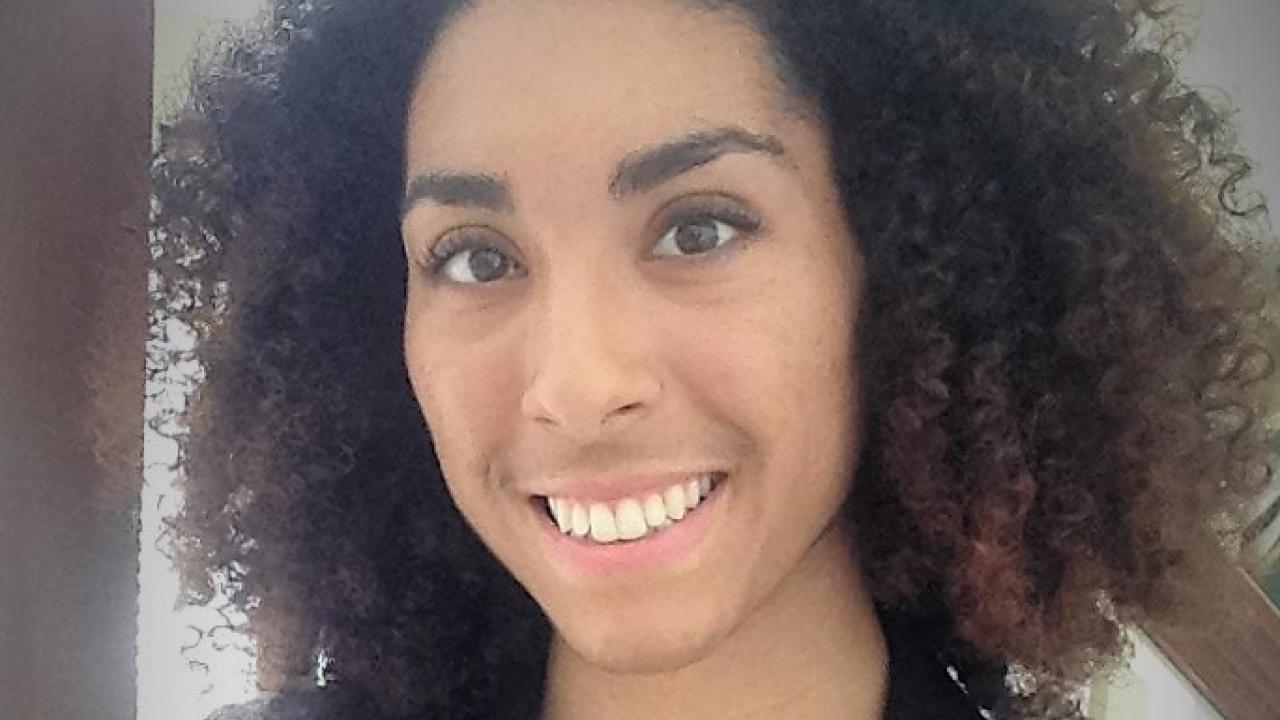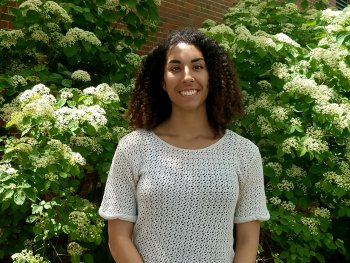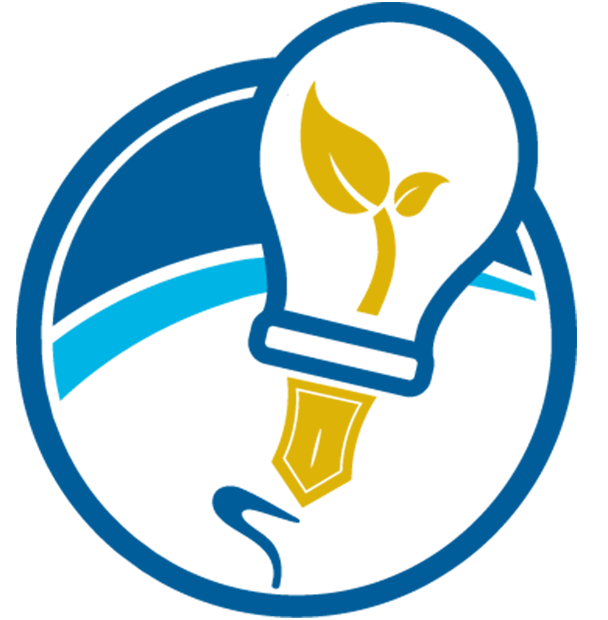
Natasha Fowler
Natasha Fowler, Psychobiology, 2015
 Undergraduate Faculty Mentor: Dr. Kevin Laugero, Department of Nutrition
Undergraduate Faculty Mentor: Dr. Kevin Laugero, Department of Nutrition
Graduate School: Michigan State University
Focus: Behavioral Neuroscience
Grad School Program: Behavioral Neuroscience Doctoral Program
Research Title: Effect of sugared beverages on stress and anxiety disorders: Implications to health
What is your hometown and state, and where are you now? Sacramento, CA, Current city is Lansing, MI
Education: Psychobiology, B.S. 2015 UC Davis; Clinical Psychology, M.A. 2018, Michigan State University
Publications: 1. Fowler, N., Vo, P., Sisk, C.L., & Klump, K.L. (2019). Stress as a potential moderator of ovarian hormone influences on binge eating in women [version 1; referees: 2 approved]. F1000Research, 8(F1000 Faculty Review): 222.
Link: https://f1000research.com/articles/8-222/v1
2. Fowler, N., Keel, P.K., Burt, S.A., Neale, M., Boker, S., Sisk, C., & Klump, K.L. (2019). Associations between ovarian hormones and emotional eating across the menstrual cycle: Do ovulatory shifts in hormones matter? International Journal of Eating Disorders, 52(2): 195-199.
Link: https://onlinelibrary.wiley.com/doi/abs/10.1002/eat.22985
3. Klump, K.L., Fowler, N., Mayhall, L., Sisk, C.L., Culbert, K.M., Burt, S.A. (2018). Estrogen moderates genetic influences on binge eating during puberty: Disruption of normative processes? Journal of Abnormal Psychology, 127(5): 458-470.
Link: https://psycnet.apa.org/record/2018-27797-001
4. Adler, S., Fowler, N., Robinson, A., Darcy, A., Toyama, H., Crisp, C., & Safer, D. (2017). Maladaptive behavioral patterns associated with dietary adherence following bariatric surgery. Obesity Surgery, 28(4):1130-1135.
Link: https://link.springer.com/article/10.1007%2Fs11695-017-2987-9
5. Klump, K.L., Culbert, K.M., O’Connor, S., Fowler, N., & Burt, S.A. (2017). The significant effects of puberty on the genetic diathesis of binge eating in girls. International Journal of Eating Disorder, 50(8):984-989.
Link: https://onlinelibrary.wiley.com/doi/abs/10.1002/eat.22727
6. Ma, R., Mikhail, M., Fowler, N., Culbert, Kristen, & Klump, K.L. (2019). Role of puberty and ovarian hormones in the genetic diathesis of eating disorders in females. Child and Adolescent Psychiatric Clinics of North America.
Link: https://www.sciencedirect.com/science/article/abs/pii/S1056499319300604?via%3Dihub
Conferences: Eating Disorders Research Society (2016, 2017, 2019)
American Society for Metabolic and Bariatric Surgery (2016)
International Conference on Eating Disorders (2017-2019)
Renfrew Center Foundation (2017, 2018)
Society for Research in Psychopathology (2018)
Keystone Symposia Conference: Functional Neurocircuitry of Feeding and Feeding Disorders (2019)
Current Employer: Michigan State University
Three words to describe me: Curious, Energetic, Adventurous
Biosketch: Natasha Fowler graduated from UC Davis in 2015 with a B.S. degree in Psychobiology and minors in Nutritional Biology and Neuroscience. While at Davis Natasha was an active member of CAMP. As a CAMP scholar, she engaged in undergraduate research under the direction of Dr. Kevin Laugero where she researched the physiologic and metabolic underpinnings of individual variability in the stress and how it can be used to explain the vulnerability to negative physical and mental effects of chronic stress. Natasha received the UC Davis Provost Undergraduate Fellowship for her research in 2016. During summer 2017, Natasha worked as clinical research coordinator for Drs. Debra Safer and Sarah Adler in the Psychiatry and Behavioral Sciences Department at Stanford University where she studied effects of changes in thyroid hormone levels in bariatric patients as predictors of weight loss and thyroid functioning post-surgery.
Working with Drs. Laugero, Safer, and Adler as an undergraduate motivated Natasha to pursue graduate school and provided her with the necessary research experience to make her a competitive applicant for graduate school. Natasha was later accepted into the Clinical Psychology PhD program at Michigan State University. After completing her master’s degree, she transferred to the Behavioral Neuroscience PhD program at Michigan State University where she currently works with Drs. Kelly Klump and Cheryl Sisk to study the genetic, behavioral, and neurobiological underpinnings of stress and ovarian hormones as they influence binge eating in women.
What are your future plans and/or goals?
My future goal is to become a professor at a major research university.
In what ways has engaging in undergraduate research impacted your future goals and plans?
Engaging in undergraduate research helped me set the foundation to progress me towards this goal. Not only did engaging in undergraduate research provide me with valuable firsthand research experience, but it also helped to develop my critical thinking, analytical, and statistical analysis skills, all of which have been tremendous assets in my graduate school endeavors. Participating in research as an undergraduate also solidified my passion for academia and convinced me that research was something that I wanted to pursue in my future. Additionally, my undergraduate work helped to shape my current research interests as a graduate student.
What preparation and research experience did you have before applying to your research program?
I worked as a CAMP scholar in Dr. Kevin Laugero's lab in the nutrition dept at UC Davis. I worked as a clinical research coordinator in Dr. Debra Safer and Sarah Adler's labs in the Psychiatry and Behavioral Sciences Department at Stanford University.
Personal achievements/accomplishments or other news and information:
I have also received numerous fellowships to support my research and training both as an undergraduate and graduate student.
What advice do you have for other undergraduate students seeking research experiences?
-Take advantage of every opportunity that you can.
-Be involved in the lab(s) that you are helping to conduct research in. Ask questions, read articles from the lab/PI/current or former graduate students, do your best to understand the big picture of the project that you working on.
-If possible, try to present at a conference.
-Talk to grad students about their research experiences.
-Apply to undergraduate research programs, both at your university and (if possible) at other universities.
-If the lab that you're working in doesn't necessarily align with your research interests, do your best to learn as many skills and information as you can to make your time there worthwhile. Skills are often transferable and can be applied in a multitude of research settings, regardless of the research question being examined.
-Alternatively, if the lab that you're working in is not a good fit for you, search for a lab that is a good fit. The more aligned your research interests and your lab's research interests are the more engaged you will be in the research, the more you will learn and enjoy what you are doing. Plus it makes it so much easier to talk about your work when you are interviewing for graduate school if you actually enjoyed what you did.
Natasha has this to say about the CAMP program:
“I loved being a part of CAMP. The experience, the opportunities, the people in the program, everything was amazing. I learned so much and grew so much as a student and researcher. Without CAMP, I wouldn't have had anywhere near the amount of opportunities that I had to present my research, work on one study, let alone multiple. The skills that I learned through the workshops and networking events, as well as the invaluable opportunity to build a network of likeminded peers, mentors, and collaborators that I will have for a lifetime are indescribable. I can’t thank CAMP enough.”
